Presidential Race Still Incredibly Close, And Likely To Stay That Way
The margin between Barack Obama and Mitt Romeny is razor-thin, and it's likely to stay that way for quite some time.
It’s been awhile since we’ve looked at any of the national polling of the Presidential race, largely because there’s no need to be obsessively discussing every new poll that comes out five months before Election Day but also for the reasons I discussed in this post, so I suppose this is as good a time as any to take a look again. Not surprisingly, not much has changed, there’s been some up and down movement by both candidates, but for the most part we’re looking at the same razor-thin close race that we have been for awhile now, and that we are likely to continue seeing for the foreseeable future. There are signs that many of the memes that have been tossed around by both campaigns and their surrogates over the past several weeks are starting to set in with voters, though. Mitt Romney is potentially vulnerable on his past at Bain Capital and the charges, fair or not, that have been made in recent Obama campaign ads, that he made his money by stripping companies down, taking money out, and abandoning them. President Obama, meanwhile, remains vulnerable on the economy, which continues to seem stagnant, and on what seems to be a renewed sense of pessimism, both on the economy and on the future of the nation in general, that seems to have settled in with voters.
You can see all of this at play in two national polls released in each of the last two days.
First up, yesterday ABC News and The Washington Post came out yesterday with a new poll of registered voters showing the race to essentially be a statistical dead heat:
After months of aggressive campaigning on jobs and the economy, President Obama and Mitt Romney, his likely Republican challenger, are locked in a dead heat over who could fix the problem foremost on voters’ minds, according to a new Washington Post-ABC News poll.
The parity on economic issues foreshadows what probably will continue to be a tough and negative campaign. Overall, voters would be split 49 percent for Obama and 46 percent for Romney if the November election were held now. On handling the economy, they are tied at 47 percent.
Despite flare-ups over issues including contraception and same-sex marriage, more than half of all Americans cite the economy as the one concern that will decide their vote in the fall, relegating others — such as health care, taxes and the federal deficit — to single-digit status.
More than eight in 10 Americans still rate the national economy negatively, but there are strains of optimism as it continues to recover from the collapse of 2008. A majority of Americans — 54 percent — say they are more hopeful than anxious about the situation over the next few years, while 58 percent are bullish about their financial prospects.
But it is a rearview-mirror assessment that could hurt Obama’s chances for a second term. One key indicator has hardly budged this year: Asked where they stand financially compared with when Obama took office in January 2009, 30 percent say they are worse off, and only 16 percent say they are better off. There is not a widespread sense that things would be better had Romney been president for the past three-plus years, but for the incumbent it is a critical measure. On this question, Obama’s numbers continue to resemble those of George H.W. Bush, who lost his bid for reelection in 1992 amid a flagging economy.
Voters are evenly divided between Obama and Romney on the question of who could kick-start the economy and also are split on job creation, with 46 percent siding with the president and 45 percent with Romney.
Obama fares better in some other assessments. He is ahead of Romney by eight percentage points on the question of who better understands people’s economic problems. He is up 52 percent to 39 percent as the one with “better personal character to serve as president,” and also by double digits as standing up for what he believes in. On “personal values,” voters are about evenly split.
Deep partisan divisions exist not only on questions that pit Obama and Romney against each other but also on perceptions of the economy. Democrats are more apt than Republicans to say the economy is in good shape, and are more hopeful about its trajectory. More Democrats than Republicans are optimistic about their financial futures.
The across-the-board partisanship makes it harder for either candidate to gain the edge — people’s views are stubbornly related to their underlying party leanings.
The Obama campaign last week attacked Romney’s record at Bain Capital, arguing that the private-equity firm made money at the companies it invested in at workers’ expense. Romney’s team responded that, overall, Bain had created jobs rather than cut them.
Romney’s record at Bain is neither a positive nor a negative, with as many poll respondents saying it is a major reason to vote for him as against him. Slightly more than half said it was not a big factor, although the underlying issue strikes a nerve.
Fully 56 percent of all Americans say an economic system favoring the wealthy is a bigger problem than regulatory overreach by the government; 34 percent say public constraints on the free market are a larger concern. But as many say they get a fair chance at financial success as say they sense a system stacked against them.
The one piece of good news in the ABC/Post poll for the President, and the area that has to be of the most concern to the Romney camp is the fact that the Democratic base seems to be far more enthusiastic right now:
A new Washington Post/ABC News poll found 93 percent of Obama supporters are enthusiastic about voting for him, compared to 75 percent of Mitt Romney’s supporters who are enthusiastic about casting ballots for him.
Of Obama’s supporters, 51 percent are very enthusiastic, while 26 percent of Romney’s are very enthusiastic.
The numbers are similar to those for Obama and McCain at this point in the 2008 race, with Obama’s enthusiasm at 91 percent and McCain’s at 74 percent
To some degree, this enthusiasm gap is likely an artifact of the GOP primary season and the doubts that many on the right had about Romney to begin with. McCain faced the same issue after the 2008 primary race, of course, and he never really recovered from it. In fact, it’s arguably the case that his selection of Sarah Palin as his running mate was an effort to gin up excitement among a conservative base that was still demoralized even as the Republican National Convention (which, remember, ended up being shortened thanks to Hurricane Gustav) approached. It worked to some extent but, of course, Palin ended up turning off independent voters so much that whatever positive impact her selection may have had was quickly negative by the time the campaign got to mid-September. Will Romney have the same problem this year? Unless he’s able to turn these enthusiasm numbers around soon, he very well could.
Following up on the ABC/Post poll, late last night we got a new poll from NBC News and The Wall Street Journal that also shows the race to be essentially a push:
Despite a volatile and eventful past few weeks in the early presidential contest, President Barack Obama continues to hold a small – and slightly narrowing – lead over Mitt Romney, according to a new NBC News/Wall Street Journal poll.
But given the public’s pessimism about the economy and the direction of the country, Romney finds himself well within striking distance in an election that has the potential to be as close as the 2004 race between Republican George W. Bush and Democrat John Kerry.
“Obama’s chances for re-election … are no better than 50-50,” says Democratic pollster Peter D. Hart, who conducted this survey with Republican Bill McInturff.
“So much has happened, and so little has changed,” Hart adds. “And it tells you this is a dead-even race.”
This poll – which was taken after the anniversary of Osama bin Laden’s death, Obama’s announcement in support of gay marriage, fresh economic worries about Europe, and last month’s tepid jobs report – shows the Democrat leading Romney by four points among registered voters, 47 percent to 43 percent.
In April, Obama’s edge in the survey was two points higher, 49 percent to 43 percent.
In the newest poll, Obama leads Romney among African Americans (88 percent to 2 percent), 18 to 34 year olds (55 percent to 35 percent), women (53 percent to 38 percent), independents (44 percent to 36 percent), and seniors (46 percent to 44 percent).
Romney, meanwhile, holds the advantage with whites (52 percent to 39 percent), men (49 percent to 40 percent), suburban residents (47 percent to 41 percent), Midwest residents (48 percent to 43 percent), and high-interest voters (47 percent to 44 percent).
As with the ABC/Post poll, we see that the economy is both the a danger for Obama and an opportunity for Romney:
Only 33 percent of respondents believe the economy will get better in the next year, which is down five points from April, and seven points from March. In addition, approval of Obama’s handling of the economy stands at 43 percent, down two points from last month.
“It feels a little tick worse” than it was earlier in the year, GOP pollster McInturff said about the economy.
What’s more, just a third of respondents think the nation is headed in the right direction, which is virtually unchanged from this year’s previous NBC/WSJ polls (but remains significantly higher than late last year, after Washington’s debt-ceiling showdown).
And by a 48 to 45 percent margin, they think the U.S. is experiencing a long-term decline versus ordinarily tough times, while another 63 percent aren’t confident that life for their children will be better than it’s been for them.
Pessimistic numbers like this remind one of America’s transformative elections, most specifically the 1980 election between Ronald Reagan and Jimmy Carter. Then, as now, the nation was suffering through a stagnant economy that was causing real economic hardship for a large part of the population. Then, as now, the international situation was at best uncertain. Then, as now, the President in office didn’t seem to be able to inspire much confidence among a largely demoralized population. The difference between then and now, of course, is that Mitt Romney is no Ronald Reagan and doesn’t seem to be capable of projecting the kind of confidence and leadership that Reagan did during that campaign, and afterwards. So, what we’ve got instead is two mostly mediocre, uninspiring candidates at a time of massive economic uncertainty and pessimism. No wonder the public doesn’t seem very thrilled with their choices.
Getting back to the numbers, the ABC/Post and NBC/WSJ results are largely consistent with what we’ve seen from other polls recently, as the RealClearPolitics Average shows:
Interestingly, the one outlier here seems to be the Fox News poll, which is the only one showing the President with a lead substantially outside the margin of error. The Rasmussen and Gallup Daily Tracking Polls, which tend to be more volatile, have generally stayed within a fairly tight range over the past month or so, which is interesting if only because Rasmussen is the only one purporting to measure the race by looking at a sample of “Likely Voters.” More broadly, though, the general trend of the polls has been interesting to say the least:
Although the gap is slightly exaggerated in the graph, what we’ve actually seen is that the gap between Romney and Obama has shrunk in recent weeks, although Romney continues to remain behind Obama, while Obama has not been able to crack the 50% mark in any recent polling. More interestingly, the general support level for both candidates is currently on a downward trends, which could be a reflection of the public being turned off at the negative turn we’ve seen in the campaign in recent weeks. But the most important data point is the one that the chart doesn’t show. Based on the RCP average, right now some 10.7% of the electorate remains undecided between Romney and Obama. These are the voters that both candidates will be fighting over for the next 167 days. That’s why this race is likely to remain tight for quite some time.
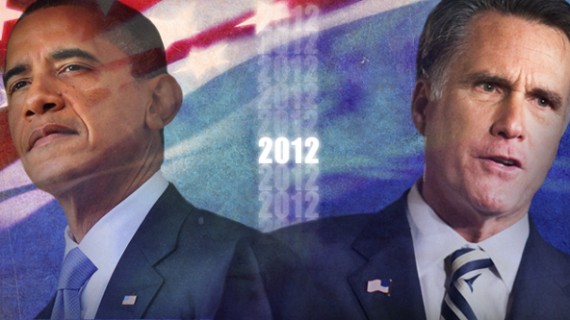
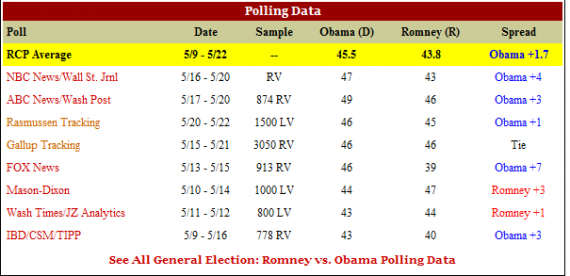
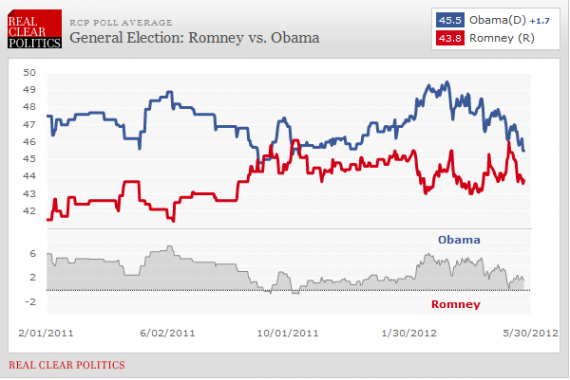

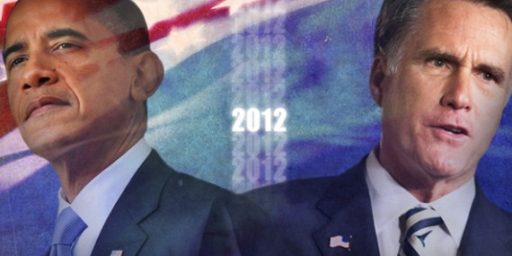


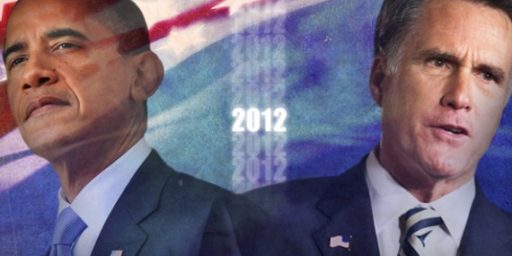
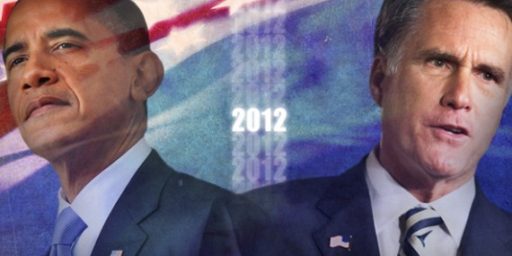
I think the real flaw in this reasoning is that Obama hasn’t really begun to run. On the other hand, Romney has been in full campaign mode through the primaries. Sure, Obama has done a few test ads, and made a few public statements, but his campaign looks to be timed for November.
If that’s true, there is a case for this being the Romney high water mark.
BTW, I think Romney is trying to drop out of the news right now so that he can establish a new campaign timeline. He needs to be “fresh” later in the year.
If you want to look at the 1/2 dozen or so swing states this might be a worthwhile conversation. These national polls mean absolutely nothing.
No polls really matter until Sept 15. No one pays that much attention until the conventions start and the conventions themselves distort the polls. You need at least a week to 2 weeks after the last convention to get a good understanding of what is going on.
In any case polls are not very interesting this time around. This election will be about turn out. Who shows up at the polls. You look at a state like SC, should be easy for Romney but it is 40 to 45% African American and Hispanic. Romney needs whites to show up in large numbers and vote overwhelmingly for him. But SC whites dont like Romney. They are not voting for Obama but they might not show up at all.
We wont know until election day who wins the turn out battle. Answering a poll is a lot easier than voting. We will just to wait and see.
That is one factor, another is that people are not yet paying attention. It will be interesting to see how Romney does when people are watching. His performance so far is not that of a strong campaigner. Obama, OTOH, has show he can bring it at game time…
Romney today vowed to lower un-employment to 6% by the end of his first term.
Now that’s an extremely ballsy position to take when you consider that the CBO has already forecast that it will drop to 6% by the end of the next term.
Oh…wait…er…anyway…it’s outside the box thinking like this that will widen the gap for Romney.
Doug’s reminded of 1980. I think the better analog is 1996 because of that cycle’s intense partisianship, unpopular challenger, and widespread contempt towards Congress.
@ Hey Norm 15:22
Keep in mind that Romney on May 4th said:
So Mr. Etch-a-Sketch is already moving the goalposts for himself from 4% to 6%…which is the current CBO projection based on existing policy. So we need Mr. Etch-a-Sketch why exactly?
Is anyone else suspicious about the accuracy of the media’s reporting on how close these races really are?
Seemed like in primary after primary was spun as “close”, until the date for the voting was nigh, and then suddenly it wasn’t.
The media has a financial interest in these horse-races being perceived as close and exciting. So do the polling agency’s.
Are we and the people distributing campaign $$ being scammed?
I was just about to say the same thing. This is an important point that is often overlooked.
@. Norm 16:09
This is important, and makes me question Doug and James positions… But the CBO forecast of 6% un-employment assumes the sunseting of the Bush Tax Cuts…Romney is predicting the same thing while promoting the extension of the Bush Tax Cuts…which to date have produced no jobs.
And again…Romney was talking about 4% a week ago.
So what are we supposed to believe???
@Dazedandconfused:
Primary contests are notoriously difficult to poll and predict, so on that particular issue I’m willing to give the media a pass. At this point I think it’s pretty clear that the race is close, but since it is the middle of May it means nothing.
The issue with the 1980 election comparison that seems to be overlooked is how much of an impact the late debate had. There was only one debate that year, a week before the election. Up until the debate, the race was very close. After the debate the election, Reagan began a rapid climb in the polls. To even imply that something similar might happen this year you have to assume that Romney is another Reagan, and Obama is another Carter. Outside of a few right-wing delusionals who have been telling themselves Obama is the black Carter, I don’t think anyone would agree to either comparison.
Of course, another major difference is that Carter’s approval ratings were in the 30s by this time, in the wake of the failed attempt to free the hostages. People had decided they were ready to fire Carter; all Reagan had to do was prove he was an acceptable candidate. Obama’s approval numbers are in the upper 40s, flirting with 50. There’s no evidence at this point that the American people as a whole have decided to fire Obama. They are still uncertain, and that case needs to be made to them.
A far more likely parallel is 2004: an incumbent essentially tied a rival from Massachusetts in mid-May. Most likely result is a narrow win by the president, but that’s far from certain.
@Hey Norm: I suspect both the CBO and Romney are wrong. Obama made a bunch of promises I knew he wasn’t going to be able to meet in 2008. Romney is doing it now and of course Newt, as he is inclined to do, promised $2.50 a gal gasoline. Now I know why they do this. If politicians want to get elected they can’t tell the voters that things are never going to be the same again. That they and their children are going to have fewer things and won’t be able to drive huge SUVs. They can’t tell them that there are going to be more of them working in the fields growing food because there won’t be fuel for the tractors and the food will have to be grown closer to the consumers because it’s going to be too expensive to ship it thousands of miles..
In a Democracy politicians can’t tell the truth.
@KariQ:
I agree with all that, but what I am thinking of specifically is something I witnessed last week, when that poll came out that showed Mitt almost even with women. It was a 2-3 day sampling of 650 people taken over a weekend. Yet, here I was watching CNN trot out David Gergen, their most credible “thinker”, who opined with all the gravity he could muster up about the deep significance.
I really don’t think he’s that stupid.